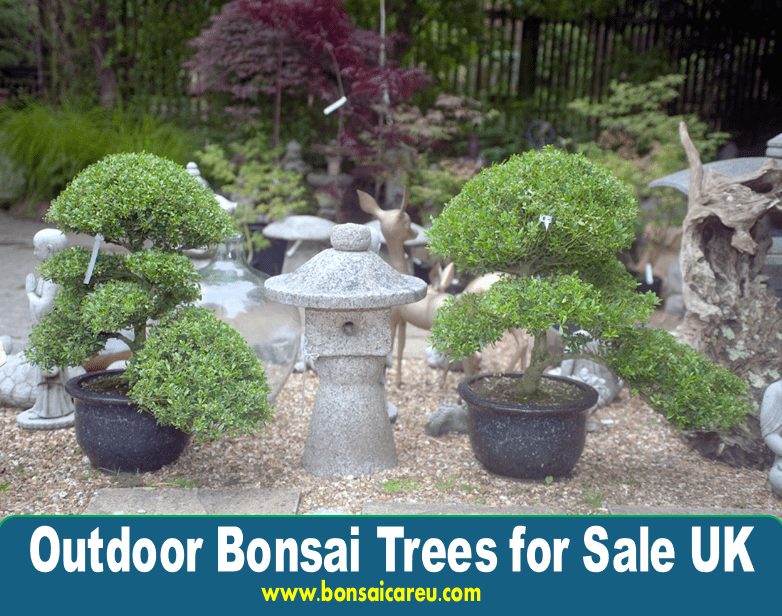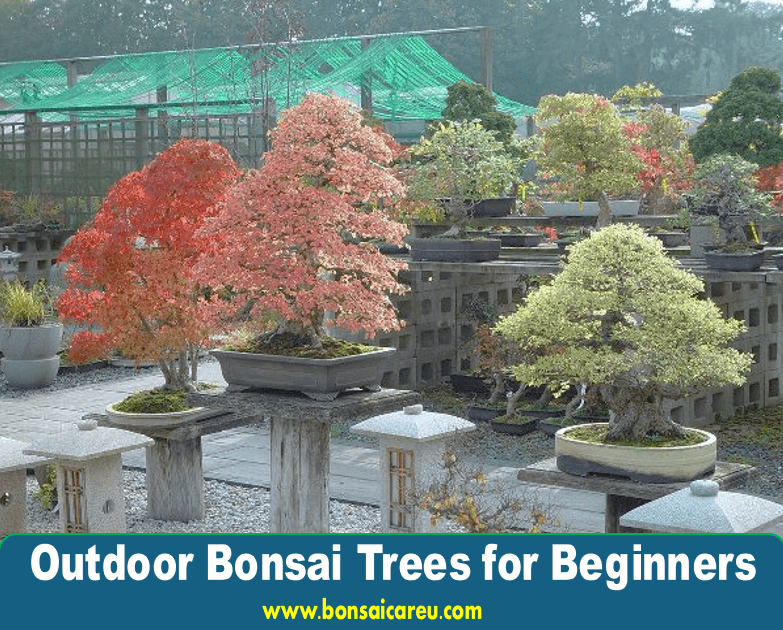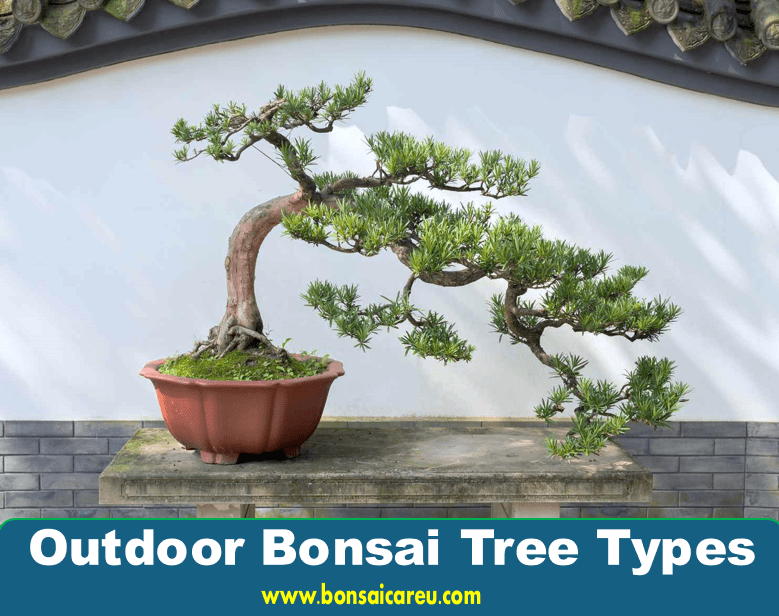Types of Outdoor Bonsai Trees: Various types of outdoor bonsai trees are available, such as Juniper, Chinese Elm, Azalea, and Ficus. These trees require proper sunlight exposure and care for healthy growth.
Ficus bonsai is highly recommended for beginners due to its resilience to underwatering and low maintenance needs. Proper sunlight is crucial for outdoor bonsai trees to prevent issues like large internodes and pest susceptibility. Conifers, like Junipers, also thrive in full sun conditions for optimal development.
The Ficus bonsai is popular in both indoor and outdoor settings, making it an excellent option for beginners looking to venture into bonsai cultivation.
Introduction To Outdoor Bonsai Trees
Outdoor bonsai trees add a touch of natural elegance to any garden or outdoor space. These carefully cultivated and pruned miniature trees have a captivating charm that can transform any outdoor environment into a serene and tranquil oasis. In this section, we’ll explore the popularity and benefits of outdoor bonsai trees and the distinctions between indoor and outdoor bonsai.
Popularity And Benefits
Outdoor bonsai trees have gained widespread popularity among gardening enthusiasts and nature lovers. Their unique appeal lies in their ability to bring the beauty and tranquility of nature into outdoor spaces, no matter how small or large. The art of growing outdoor bonsai trees has been cherished for centuries, with each tree carrying a rich history and symbolism.
One of the primary benefits of outdoor bonsai trees is their ability to thrive in natural sunlight, allowing them to exhibit their full splendor in outdoor settings. Additionally, these trees contribute to a harmonious outdoor atmosphere, promoting relaxation and a sense of peace.
Indoor Vs. Outdoor Bonsai Distinctions
When distinguishing between indoor and outdoor bonsai trees, the primary consideration is the environmental requirements of each type. Outdoor bonsai trees, such as junipers, maples, and azaleas, are specifically cultivated to withstand outdoor conditions, including exposure to sunlight, temperature variations, and natural elements.
On the other hand, indoor bonsai trees, like ficus and jade plants, are suited for indoor environments and require specific care related to lighting, humidity, and temperature. Understanding these distinctions is crucial for selecting the right type of bonsai tree based on the intended location for cultivation.
Conifers: The Evergreen Choice
Conifers are a popular choice for outdoor bonsai trees due to their evergreen foliage and ability to thrive in full sun. Types of conifers commonly used for bonsai include juniper, bald cypress, and Chinese elm.
Juniper Varieties
Regarding conifers, juniper bonsai trees are a popular choice among bonsai enthusiasts. They are known for their resilience and adaptability to different growing conditions. There are over 50 varieties of juniper, each with unique characteristics. Some popular juniper varieties for bonsai include:
- Shimpaku Juniper
- Chinese Juniper
- Rocky Mountain Juniper
- Japanese Garden Juniper
Pine Bonsai Basics
Pine bonsai trees are another popular choice for outdoor bonsai. They are known for their delicate needles and rugged bark, which add a unique touch to any garden. Some important things to keep in mind when caring for a pine bonsai include:
- Proper soil mix: Pines prefer well-draining soil with a slightly acidic pH level
- Sunlight: Pines need plenty of sunlight to thrive, so make sure to place your tree in a sunny location
- Watering: Pines need consistent watering, but be careful not to over-water, as this can lead to root rot
- Pruning: Regular pruning is important to maintain the shape and health of your pine bonsai tree
Conifers, particularly junipers, are a great choice for those looking for an evergreen bonsai tree. With their resilience and unique characteristics, they can add a touch of beauty to any outdoor garden. Pine bonsai trees are another popular choice, but they require specific care to ensure their health and growth. No matter which type of outdoor bonsai tree you choose, research its specific care requirements to ensure its longevity and beauty.
Deciduous Delights
Delve into the enchanting world of deciduous bonsai trees, where Maple Majesty and Elm Elegance reign supreme.
Maple Majesty
With their vibrant colors and intricate branching patterns, Maple bonsai trees add a touch of majesty to any outdoor bonsai collection. These trees are known for their stunning fall foliage, ranging from fiery reds to golden yellows.
Elm Elegance
Elm bonsai trees exude elegance with their graceful, arching branches and delicate leaves. These trees are prized for their resilience and adaptability, making them ideal for bonsai enthusiasts.
Flowering And Fruiting Varieties
Flowering and fruiting bonsai trees add an extra dimension of beauty and interest to outdoor spaces. These varieties offer stunning blooms and produce fruits, making them unique additions to any bonsai collection. Let’s explore two captivating options: Azalea Bonsai Charm and Pomegranate Bonsai Vibrance.
Azalea Bonsai Charm
With its delicate and colorful blossoms, the Azalea Bonsai Charm is a sight to behold. This variety of bonsai trees offers a profusion of vibrant flowers, creating a stunning display during the blooming season. Due to its captivating beauty and relatively low maintenance requirements, the Azalea Bonsai Charm is a popular choice for outdoor bonsai enthusiasts.
Pomegranate Bonsai Vibrance
The Pomegranate Bonsai Vibrance is renowned for its striking appearance and the unique addition of edible fruits. This bonsai tree features beautiful flowers and produces small pomegranate fruits, adding an element of fascination and practicality. The Pomegranate Bonsai Vibrance is a remarkable choice for those seeking a visually appealing and fruitful outdoor bonsai tree.
Broadleaf Evergreens
Broadleaf evergreens are popular for outdoor bonsai enthusiasts due to their year-round foliage and adaptability to various climates. These types of trees offer various options for creating stunning outdoor bonsai displays. Below, we delve into two captivating broadleaf evergreens: Chinese Elm Allure and Ficus Bonsai Versatility.
Chinese Elm Allure
The Chinese Elm (Ulmus parvifolia) is a highly sought-after bonsai tree for outdoor cultivation. Its small, glossy, and serrated leaves create a delicate appearance, while its twisting trunk and fine twigging add to its allure. This tree is known for its rapid growth and ability to develop intricate root structures, making it a favorite among bonsai artists.
Ficus Bonsai Versatility
The Ficus genus encompasses diverse trees suitable for outdoor bonsai cultivation. Ficus trees are revered for their adaptability to different styling techniques and ability to thrive indoors and outdoors. Their small, dark green leaves and aerial roots contribute to their versatility, allowing for various bonsai designs and artistic expressions.
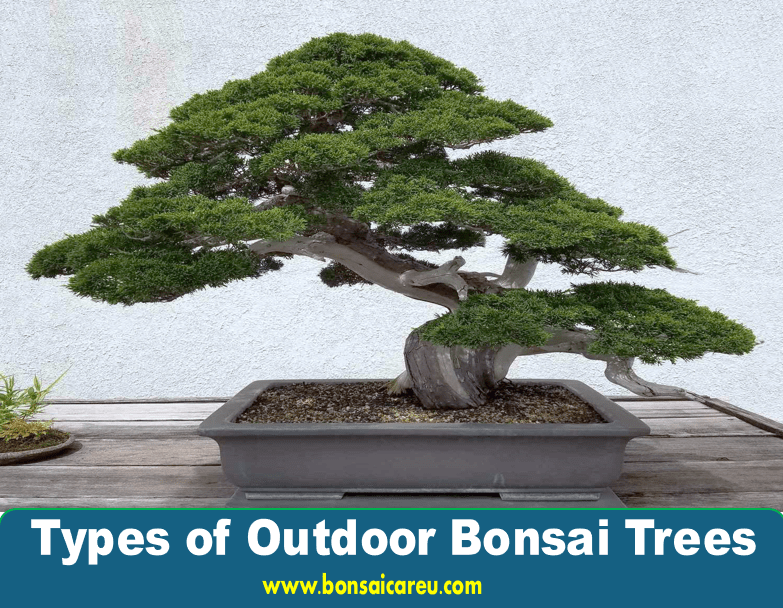
Caring For Your Outdoor Bonsai
When caring for your outdoor bonsai, consider the types of trees, such as the Chinese Elm, Juniper, or Azalea. Each tree needs specific care to thrive in an outdoor environment, so understanding the requirements of your specific bonsai tree type is essential for its well-being.
Sunlight And Placement
Place your outdoor bonsai tree where it can receive direct sunlight for at least 6 hours daily. Ensure it is shielded from harsh afternoon sun to prevent scorching.
Watering And Feeding
Water your outdoor bonsai regularly, ensuring the soil is moist but not soggy. Use a well-draining soil mix to prevent root rot. Feed your bonsai with a balanced fertilizer during the growing season.
Caring for your outdoor bonsai involves proper placement to ensure it receives adequate sunlight and watering it regularly with a well-draining soil mix. Remember to feed your bonsai with balanced fertilizer during the growing season.
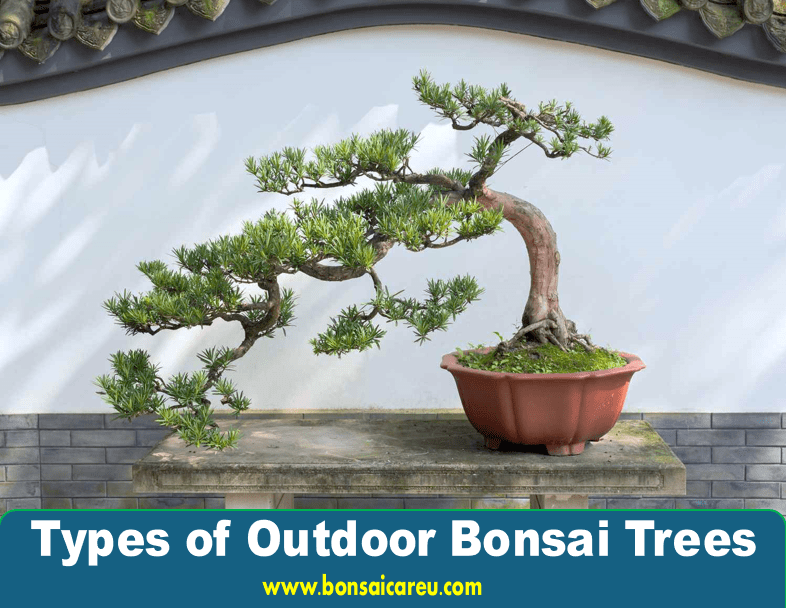
Frequently Asked Questions For Types of Outdoor Bonsai Trees
What Is The Easiest Bonsai Tree To Grow Outdoors?
The easiest bonsai tree to grow outdoors is the Ficus Bonsai. It is resilient to underwatering, making it ideal for beginners. Outdoor bonsai trees need sunlight for a few hours daily for healthy growth. The Ficus is also tolerant of low humidity, making it easy to care for.
Can You Bonsai An Outdoor Tree?
Yes, you can bonsai an outdoor tree. Most outdoor bonsai trees need sunlight for healthy growth.
What Is The Easiest Bonsai Tree To Keep Alive?
The easiest bonsai tree to keep alive is the Ficus Bonsai. It is resilient, tolerates low humidity, and is beginner-friendly.
What Is The Most Hardy Bonsai Tree?
The most hardy bonsai tree is the Chinese Elm, known for its resilience and ability to thrive in various conditions.
What Are The Best Outdoor Bonsai Tree Species?
Several outdoor bonsai tree species are available, including Juniper, Ficus, Azalea, Japanese Maple, and Chinese Elm. Each species has unique characteristics and care requirements.
How Often Should Outdoor Bonsai Trees Be Watered?
Outdoor bonsai trees should be watered when the soil starts to dry out. The watering frequency depends on factors such as the tree species, weather conditions, and the type of soil used.
Conclusion
Selecting the right outdoor bonsai tree is crucial for its growth and maintenance. The various options, from Ficus to Juniper, cater to different preferences and skill levels. Consider sunlight exposure and care requirements to ensure a thriving bonsai garden.
